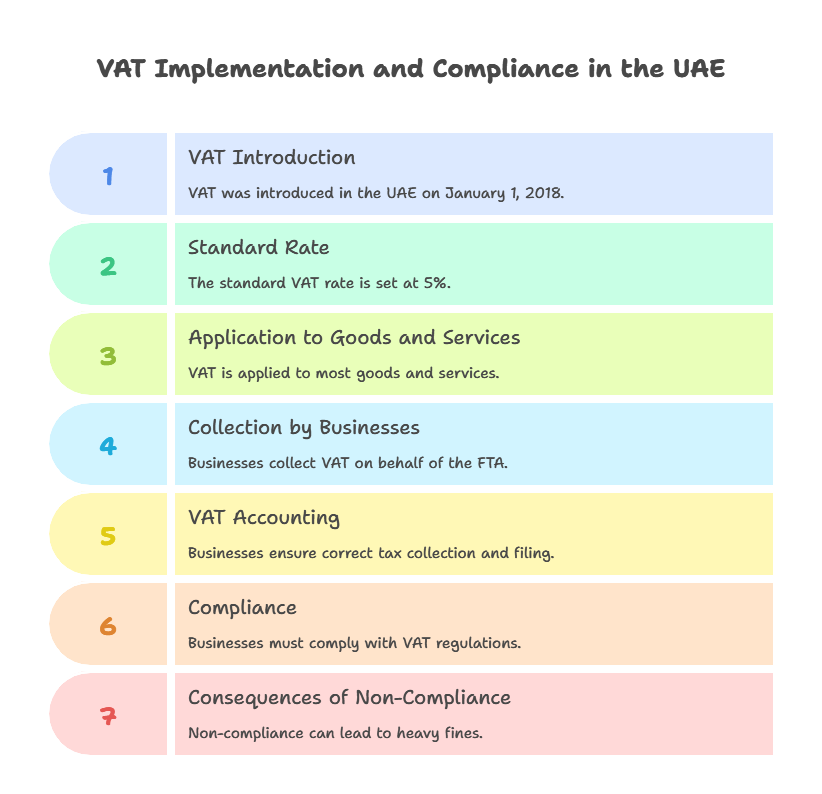
Introduction to VAT in the UAE
VAT was introduced in the UAE on January 1, 2018, with a standard rate of 5%.
It is applied to most goods and services and collected by businesses on behalf of the Federal Tax Authority (FTA).
For businesses, VAT accounting ensures correct tax collection, filing, and compliance. Failing to comply can lead to heavy fines, making it crucial for companies to understand their obligations.
What is VAT and why does it matter?
VAT is a consumption-based tax charged at each stage of the supply chain. Businesses charge VAT on sales (output VAT) and reclaim VAT paid on purchases (input VAT). This ensures fairness and avoids double taxation.
History of VAT implementation in the UAE
The UAE introduced VAT as part of the Gulf Cooperation Council (GCC) Unified Agreement. It helps diversify government revenue away from oil and ensures long-term economic stability.
VAT Registration Requirements
Any business with taxable supplies exceeding AED 375,000 annually must register for VAT. Businesses with supplies above AED 187,500 may register voluntarily.
Mandatory vs voluntary registration
- Mandatory: Above AED 375,000 turnover.
- Voluntary: Between AED 187,500 and AED 375,000.
Who is exempt from VAT?
Some businesses such as those dealing in certain financial services, residential property after first supply, and local passenger transport are exempt.
Key Concepts of VAT Accounting
Input VAT and Output VAT
- Output VAT: Tax collected on sales.
- Input VAT: Tax paid on purchases, which can be reclaimed if eligible.
VAT-inclusive vs VAT-exclusive pricing
Invoices must clearly state whether prices are inclusive or exclusive of VAT. This prevents disputes with customers and ensures transparency.
VAT Filing and Compliance in the UAE
Filing deadlines and frequency
Businesses generally file VAT returns quarterly, though some may file monthly depending on turnover. Filing is done electronically via the FTA portal.
Record-keeping obligations
Companies must keep VAT records, invoices, and supporting documents for at least five years. This ensures transparency and simplifies audits.
VAT Rates in the UAE
Standard rate of 5%
Applies to most goods and services, including retail, hospitality, and professional services.
Zero-rated supplies
- Exports outside the GCC
- Certain healthcare and education services
- International transport
- Exempt supplies
- Residential property (except first supply)
- Local passenger transport
- Selected financial services
VAT Refunds in the UAE
Refunds for businesses
Businesses can reclaim excess input VAT if it exceeds output VAT. Claims are made through the FTA portal.
Tourist VAT refund scheme
Tourists can claim VAT refunds at designated refund kiosks in airports and malls, enhancing UAE’s appeal as a shopping hub.
VAT Penalties and Fines
Common mistakes that lead to penalties
- Late registration or filing.
- Charging VAT on exempt items.
- Incorrect input VAT claims.
How to avoid fines
- Register on time.
- File returns before deadlines.
- Use accounting software for accuracy.
VAT and Industry-Specific Considerations
Real estate sector
Commercial properties are subject to VAT, while residential properties are generally exempt after first supply.
E-commerce businesses
VAT applies to online sales in the UAE. E-commerce companies must ensure compliance, especially with cross-border sales.
Free zones and special cases
Some designated free zones enjoy special VAT treatments, though businesses must carefully check FTA rules.
The Role of Technology in VAT Accounting
Cloud-based accounting tools
Platforms like Zoho Books, QuickBooks, and Xero simplify VAT tracking and filing.
Automated VAT filing systems
Automation reduces manual errors, ensures accuracy, and saves time for businesses.
Choosing the Right VAT Consultant
Benefits of professional support
VAT consultants help businesses with registration, filing, audits, and compliance. They minimize risks and ensure accuracy in tax management.
Conclusion
VAT accounting in the UAE is essential for legal compliance and financial efficiency.
Businesses must register if required, maintain accurate records, and file VAT returns on time.
By adopting digital tools and, if necessary, working with VAT consultants, companies can stay compliant while focusing on growth.


